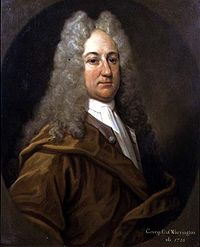- Booth Baronets
-
There have been three Baronetcies created for persons with the surname Booth, one in the Baronetage of England and one in the Baronetage of the United Kingdom. One creation is extant as of 2010. The holders of the first creation were elevated to the peerage as Baron Delamer and Earl of Warrington.
The Booth Baronetcy, of Dunham Massey in the County of Chester, was created in the Baronetage of England on 22 May 1611 for Sir George Booth, Sheriff of both Lancashire and Cheshire. The Booths were amongst the first eighteen families raised to the baronetage when the Order of Baronets was first instituted by James I in 1611. Booth was succeeded by his grandson, the second Baronet. In 1661 he was raised to the Peerage of England as Baron Delamer, of Dunham Massey in the County of Chester. On his death the title passed to his eldest surviving son, the second Baron. He served as Chancellor of the Exchequer between 1689 and 1690. On 17 April 1690 he was made Earl of Warrington in the Peerage of England. The earldom became extinct on the death of his son, the second Earl, in 1758. The baronetcy and barony was passed on to the late Earl's first cousin, the fourth Baron. He was the son of the Venerable Robert Booth, Dean of Bristol, younger son of the first Baron. On his death in 1770 the barony became extinct. However, he was succeeded in the baronetcy by his second cousin, the sixth Baronet. He was the grandson of Nathaniel Booth, younger brother of the first Baron. The baronetcy became dormant on his death in 1797.
The Hon. Langham Booth, younger son of the first Earl of Warrington, sat as Member of Parliament for Cheshire. Lady Mary Booth, daughter of the second Earl, married Harry Grey, 4th Earl of Stamford. In 1796 the barony of Delamer and earldom of Warrington were revived in favour of their son, George Grey, 5th Earl of Stamford. See Earl of Stamford for more information on this branch of the family.
The Booth Baronetcy, of Portland Place in the County of London, was created in the Baronetage of the United Kingdom on 27 March 1835 for the wealthy gin distiller Felix Booth. This family may have been scions of the ancient Booth family of Dunham Massey, their coat of arms alluding to a connection by displaying the distinctive boars' heads, although this is unproven. The title became extinct on the death of the third Baronet in 1896.
The Booth Baronetcy, of Allerton Beeches in the City of Liverpool, was created in the Baronetage of the United Kingdom on 24 January 1916 for Alfred Allen Booth, a Director of Alfred Booth and Company and Chairman of the Cunard Steamship Company. He was a member of a cadet branch of the ancient Cheshire family, being descended from the Booths of Twemlow. As of 2011 the title is held by his grandson, Doug Booth, the third Baronet, who succeeded his father in 1960. He is a television and film writer living in the United States. The eminent Victorian social researcher and philanthropist Charles Booth was the uncle of the first Baronet; to Gladstone's dismay, he declined offers of elevation to the peerage.
The Gore-Booth Baronets are descended in the maternal line from the Salford branch of the ancient Booths of Dunham Massey. See Gore Baronets for more information on this title.
Contents
Booth Baronets, of Dunham Massey (1611)
- Sir George Booth, 1st Baronet (1566–1652)
- Sir George Booth, 2nd Baronet (1622–1684) (created Baron Delamer in 1661)
Barons Delamer (1661)
- Sir George Booth, 2nd Baronet (1622–1684)
- Henry Booth, 2nd Baron Delamer (1652–1694) (created Earl of Warrington in 1690)
Earls of Warrington (1690)
- Henry Booth, 1st Earl of Warrington (1652–1694)
- George Booth, 2nd Earl of Warrington (1675–1758)
Barons Delamer (1661; Reverted)
- Nathaniel Booth, 4th Baron Delamer (1709–1770)
Booth Baronets, of Dunham Massey (1611; Dormant)
- Rev Sir George Booth, 6th Baronet (1724–1797)
Booth Baronets, of Portland Place (1835)
- Sir Felix Booth, 1st Baronet (d. 1850)
- Sir Williamson Booth, 2nd Baronet (1811–1877)
- Sir Charles Booth, 3rd Baronet (1812–1896)
Booth Baronets, of Allerton Beeches (1916)
- Sir Alfred Allen Booth, 1st Baronet (1872–1948)
- Sir Philip Booth, 2nd Baronet (1907–1960)
- Sir Douglas Allen Booth, 3rd Baronet (b. 1949)
See also
- Earl of Stamford
- Gore-Booth Baronets
- Lord Gore-Booth
References
- Kidd, Charles, Williamson, David (editors). Debrett's Peerage and Baronetage (1990 edition). New York: St Martin's Press, 1990.
- Leigh Rayment's List of Baronets
- www.thepeerage.com
- Cracroft's Peerage
Categories:- Baronetcies
- Extinct baronetcies
Wikimedia Foundation. 2010.

